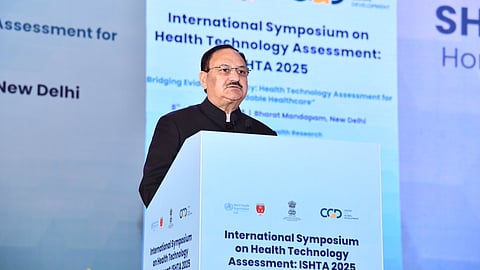

NEW DELHI: Union Health Minister JP Nadda on Saturday said the central government is focused on providing healthcare that is preventive, curative, palliative, and rehabilitative.
Inaugurating the third International Symposium on Health Technology Assessment (ISHTA 2025), Nadda mentioned the vision and commitment of Prime Minister Narendra Modi to strengthen India's healthcare system and ensure accessible and affordable healthcare for all.
He highlighted the critical role of Health Technology Assessment (HTA) in advancing evidence-based policymaking to build an efficient, equitable, and high-quality health system, aligned with the goals of Universal Health Coverage (UHC).
"The government is focused on providing healthcare, which is preventive, curative, palliative, and rehabilitative," he said at the symposium Bridging Evidence to Policy: Health Technology Assessment for Affordable Healthcare, organised by the Department of Health Research (DHR) under the Union Health Ministry.
"The Centre has laid an emphasis on primary, secondary, as well as tertiary healthcare," he said.
Nadda said 22 state-of-the-art All India Institute of Medical Sciences (AIIMS) have been established till now, and there has been a substantial increase in the number of MBBS and MD seats, along with a rise in the training of paramedic and nursing staff.
He said the central government will add 75,000 seats in the medical sector, with 30,000 seats already created last year.
Noting that HTA India resource centres are spread over 19 states, he said these serve as an important mechanism for priority setting and have helped immensely in achieving various health goals, such as tuberculosis (TB) detection, optimising healthcare costs, and incorporating evidence-based data in national health programmes.
Nadda also released several key resources, including the Open Real-Time PCR Kit for Diagnosis of Pulmonary Tuberculosis (Quantiplus MTB FAST Detection Kit developed by Huwel Lifesciences), the HTA Technologies Compendium, the HTA Costing Database, as well as the Patent Mitra initiative.
"With the launch of these flagship initiatives, our country is taking a significant leap towards supporting our innovators. This platform is designed to provide crucial support to scientists, researchers, and institutions, ensuring that their ground-breaking works are protected through patents and made available to the public through seamless technology transfer," he said.
He also highlighted that the Medical Education Patent Mitra initiative of the Indian Council of Medical Research (ICMR) aligns with the Med Tech Mitra initiative, a testament to the ICMR's commitment to advancing medical innovation.
This programme, developed under the guidance of NITI Aayog and in partnership with the Department of Pharmaceuticals (DoP), is supported by the Department for Promotion of Industry and Internal Trade (DPIIT). It aims to provide end-to-end guidance and handholding support to innovators for patent filings and technology transfer of medical innovations to the industry.
"Medical innovation Patent Mitra is a testament of ICMR’s commitment to advancing medical innovation. With the launch of this initiative, our country is taking a significant leap towards supporting our innovators. This platform will ensure that the ground-breaking work done by our scientists and researchers is protected through patents and made available to the public through seamless technology transfer. This visionary effort propels India towards attaining the goal of Viksit Bharat."
He said HTA helps in reinforcing the Centre's commitment to providing inclusive, affordable, equitable, and accessible healthcare for all. "HTA will play an important role in the realisation of Viksit Bharat by 2047, as envisaged by our prime minister."
The event was organised by the Department of Health Research (DHR), Ministry of Health and Family Welfare, Government of India, in collaboration with the World Health Organisation (WHO) India Country Office and the Centre for Global Development (CGD).